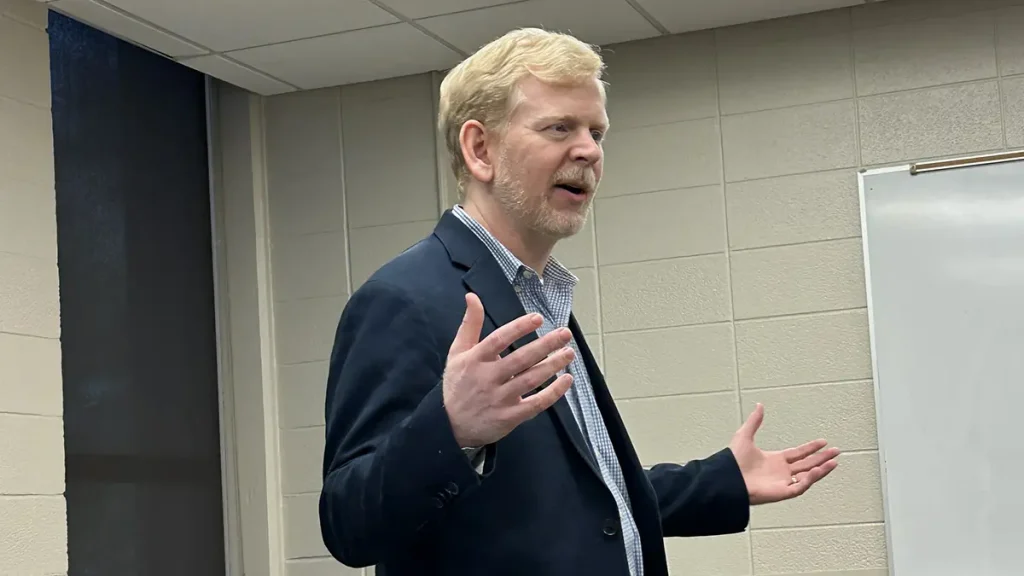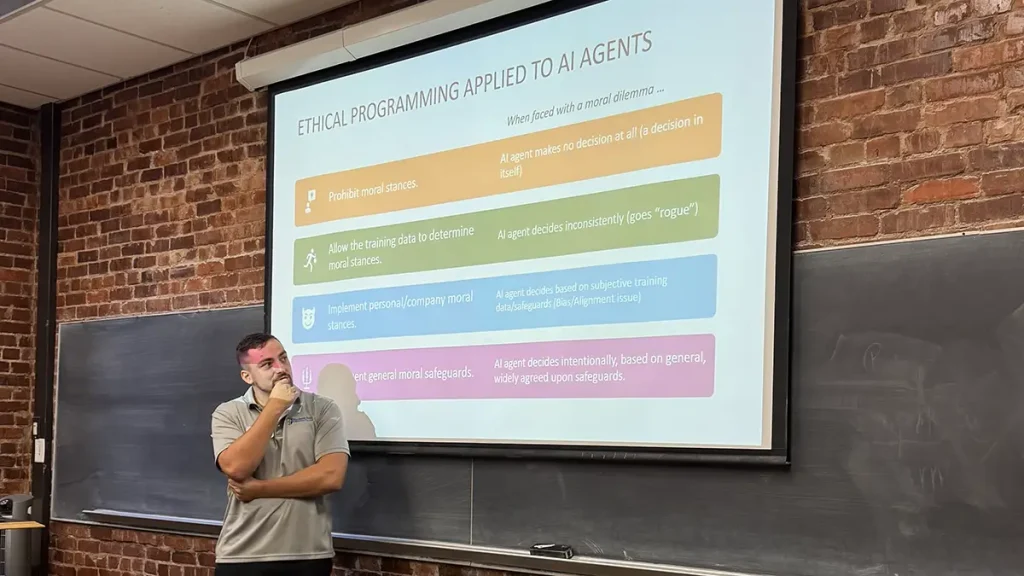New Course Prepares Vols for Ethical Use of AI

A new course launched this fall to help equip University of Tennessee students with skills to navigate ethics when engaging with artificial intelligence (AI) platforms. Adam Cureton, Lindsay Young Professor of Philosophy, developed the undergraduate-level course to give students a forward-looking edge with these quickly evolving tools.
The College of Arts and Sciences awarded Cureton a grant to create the course—titled PHIL 246: Ethics and Technology—in accordance with the AI in the Classroom initiative set forth by Academic Programs Associate Dean Liem Tran’s office.
“The course focuses on ethical issues raised by emerging technologies, which in our current moment is mainly the ethics of generative AI,” said Cureton. “As generative AI and other technologies continue to grow and change, institutionalized forums are needed to respond to relevant ethical issues as they arise.”
Keeping Pace with AI Technology
The moving target that is generative AI makes it difficult to keep up with identifying and addressing these ethical questions. Forums such as this new course must maintain open and ongoing dialogue to keep pace.
“Philosophers are well-suited to guide these discussions because of our training and research in ethical theory, ethical analysis, and ethical deliberation,” said Cureton. “Since many of the relevant moral issues concern undergraduate students across all majors, there should be a place for them to think for themselves—and in collaboration with others—about the ethical impacts and potential dangers of AI in their own education and on society more broadly.”
A prevalent theme of PHIL246 is the ethics of using generative AI in learning and research: costs and benefits, direct and indirect ethical implications, policies and guidelines, and responsible use.
“We also discuss more general issues that are essential for student awareness of AI,” said Cureton. “These include whether machines can think and choose, impacts of AI on democracy and human rights, the ethical importance of explanation and the ‘Black Box’ problem (the difficulty of understanding how AI systems make decisions), and AI governance.”
Teaching AI Right from Wrong

Philosophy graduate student Hunter Kallay helped Cureton develop the syllabus and teaching materials for the course, which Kallay now attends as part of his graduate-level independent study on the ethics of AI.
“Hunter regularly shares important insights and expertise with the class, discusses course material with students outside of class, and provides valuable suggestions on how to improve the course,” said Cureton. “My hope is that he will be able to teach it on his own, which would provide him with valuable teaching experience in an emerging and rapidly growing area of philosophy.”
Kallay gave a presentation on topics stemming from the course at the Society for Ethics Across the Curriculum conference, held in October 2024 at Clemson University. He outlined current methods that developers use for ethically safeguarding AI agents—AI doctors, therapists, lawyers, self-driving cars, etc.—and approached the question of how these agents should be programmed to handle moral dilemmas.
“The purpose of this presentation was not to provide a perfect solution to the problem, but to highlight the need for philosophical discussions in this area,” said Kallay. “I articulated some issues with current approaches—namely, they are often biased. When faced with moral dilemmas, these agents can render judgements that result in moral atrocities. I believe a better approach for ethical AI is to reflect on ways to implement general, widely agreed upon moral principles rather than by leaning on the subjective moral opinions of Silicon Valley programmers.”
Student Engagement for Better AI
Response to his presentation was strong, followed by a lengthy questions and answer session that revealed a prevailing negative view of AI from attendees across disciplines. The experience brought home the value of Cureton’s new course—giving UT students the tools to help “fix” AI.
The first class of students has enjoyed a positive exchange of ideas over these tough questions of philosophy and technology.
“I’ve never seen a class more enthusiastic about participating and sharing their thoughts, and that’s super exciting for this rapidly advancing field of philosophy,” said Kallay. “It’s enlightening to participate in the class and get to hear their fresh perspectives.”
By Randall Brown